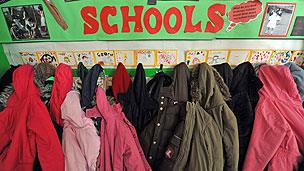Primary schools national 'offer day' for places
- Published

The government says it wants to make it easier for successful schools to expand and offer more places
Primary schools in England are to have a single, co-ordinated day for offering places, under a revised admissions code published by the government.
About 800,000 children will hear about their primary school places on the same day - 16 April - following a similar national scheme for secondary schools.
The admissions rules will also be changed to make it easier for oversubscribed schools to expand.
Schools Minister Nick Gibb said the new code brought "clarity and consistency".
The ATL teachers' union accused the changes, such as allowing schools to expand without getting the approval of local authorities, as being driven by the government's "ideological preferences".
The revised admissions code is intended to create a simpler and less bureaucratic approach to the process of applying and receiving school places.
Extra places
The setting up of a single day for allocating primary school places, to be introduced from autumn 2014, will mean that parents across England will receive their offer at the same time, regardless of where they live.
The schools minister says this will make it less "confusing and stressful" for parents who are applying for school places across local authority boundaries, with councils currently having different dates for offering places.
It will follow the so-called National Offer Day for secondary schools, when places are allocated at the beginning of March following applications submitted by parents in the autumn.
Adopted children who have previously been in care will also have greater priority in applications, affecting about 3,000 children each year.
The revised code confirms other proposed changes, such as making it easier for individual schools to increase their number of places, without needing the permission of local authorities.
There is no upper limit on the scale of the expansion - other than the practicalities of space and health and safety regulations.
'Inequitable'
The ASCL head teachers' union warned that allowing individual schools to add places could have a negative impact on other neighbouring schools.
"The risk is that it will create sink schools in areas of deprivation and hit hardest those children whose parents do not or cannot actively support their education," said general secretary Brian Lightman.
But the schools minister says it will remove a barrier to the creation of more "good school places".
Schools will also be able to give greater priority to the children of staff at the school.
There will be a ban on "area-wide" lotteries for places, such as within a local authority.
Free schools and academies will be able to prioritise applications from children eligible for free school meals.
There will also be flexibility over the limit of 30 pupils in infant classes to make room for twins or children of service personnel needing places outside of the usual admissions round.
There are already exceptions on infant class sizes for looked-after children and those with special needs who need to apply outside the usual admissions times.
The amount of time for parents to appeal against a decision will be extended from 10 days to 20 days.
The revised code also highlights differences in responsibility, which will be increasingly significant if more schools become academies.
While councils can require local authority schools to take a pupil without a place, there is no such obligation for academies.
Head teachers' leader Mr Lightman said all schools should co-operate on arrangements for "hard to place" pupils.
"It is inequitable to impose different rules on academies and other types of schools," he said.
Daniela Wachsening, education policy adviser at the Association of Teachers and Lecturers, said the "changes are extremely likely to undermine fairness and socially balanced school intakes to the detriment of the most vulnerable and disadvantaged pupils".
The admissions process can be a fraught time for families as they seek places in schools which might be oversubscribed.
This year one in three families in London did not get their first preference of secondary school.
"The new admissions codes are slimmer, less repetitive and easier to read and use," said Mr Gibb.
"For these reasons alone they should help to reduce the stress confronting parents as they navigate the schools admissions system and find a place for their child.
"But the new codes also remove the restriction on good schools being able to expand if they wish - a freedom that will provide more good school places."
- Published16 April 2011
- Published1 March 2011
- Published23 May 2011